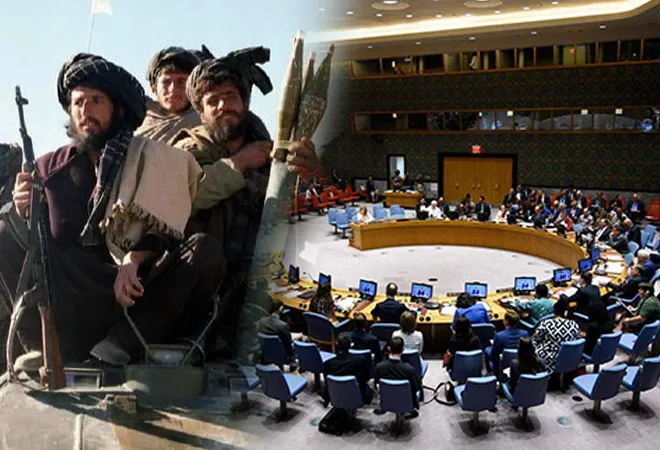-
CENTRES
Progammes & Centres
Location
Is the UN biding its time by bringing the Taliban to the negotiating table while still not according it official recognition?

The situation in Afghanistan—and the Taliban’s presence in the region—has been a matter of discussion before the United Nations Security Council (UNSC) since the late 1990s. The Taliban emerged after the withdrawal of Soviet troops, and gained effective control over a majority of Afghan territories in 1996. The Afghan conflict quickly escalated and concerns surrounding the Taliban’s repressive policies and its purported support to terrorists gained greater international traction. The US war on Afghanistan—following the events of 9/11—resulted in the permanent presence of American troops in the country, a reality that ended with a hasty withdrawal in August 2021. As such, the UNSC has passed several resolutions on the Afghan conflict, and continues to do so today, given the evolving situation in the country.
In tandem with the political developments in Afghanistan, the United Nations’ (UN) relationship with the Taliban has evolved over the years. From endorsing the Bonn agreement for creation of an interim government after Taliban’s ouster in 2001 to a proposal to pay US $6 million for security in 2021, things have changed drastically in the past two decades. The change in relationship between Taliban or Islamic Emirate of Afghanistan—a militant, Islamist, jihadist political movement—and the UN can be traced through the language used in the resolutions passed by the UNSC over the years.
From endorsing the Bonn agreement for creation of an interim government after Taliban’s ouster in 2001 to a proposal to pay US $6 million for security in 2021, things have changed drastically in the past two decades.
Initial UNSC resolutions on the Taliban used strong language of censure to condemn and denounce their actions. The resolutions utilised language such as “deploring” measures taken by Taliban, which resulted in the evacuation of UN humanitarian personnel, and “condemns” the capture by the Taliban of Iranian dignitaries and diplomats in Resolution 1214 in 1998. As recently as 2019, the Taliban was clubbed with the other violent, extremist and illegally armed groups such as Al-Qaeda and ISIL (Da’esh) affiliates in Resolution 2501. The UNSC had been highly critical of the extremist group, and rightfully so.
However, the language used to refer to the Taliban has changed with recent developments. Particularly when the Taliban entered into negotiations with the US, and then subsequently captured the country on August 15 last year, the UNSC’s stance towards the group seems to have been softened. The same can be noted in the UNSC Resolution 2513, where the UNSC lauded the Taliban’s so-called commitment towards preventing the use of Afghan soil for terrorism purposes and entering into intra-Afghan negotiations.
Notably, Resolution 2543 states that ‘neither the Taliban nor any other Afghan group or individual should support terrorists operating on the territory of any country’ whereas Resolution 2596, provides that ‘no Afghan group or individual should support terrorists operating on the territory of any country’. It can be clearly observed here that the UNSC has only omitted the reference to ‘Taliban’ while retaining the remaining phrase.
Particularly when the Taliban entered into negotiations with the US, and then subsequently captured the country on August 15 last year, the UNSC’s stance towards the group seems to have been softened.
The recent UNSC Resolution 2593 strongly condemns the attacks carried out by the Islamic State in Khorasan Province on the Hamid Karzai International Airport and reaffirms commitment of the international community to ensure peace in the country. This resolution resembles the UNSC Resolution 1267, which came in the aftermath of the attacks on US embassies in Nairobi, Kenya and Dar es Salaam. However, Resolution 1267 implies that if the Taliban fails to comply with its obligations, it could be deemed as a ‘threat to international peace and security’ and hence authorize the UNSC to invoke Chapter VII of the UN Charter. In contrast, Resolution 2593 lacks any terms for effective enforcement. Further, this resolution uses milder terms such as ‘notes’, ‘calls for’ and ‘condemns’ rather than stringent terms such as ‘strongly condemns’ or ‘urges’, which have been used in the past. In fact, in the first draft, which was objected to by Russia and China, the onus of responsibility on Taliban was much higher as compared to the one that was eventually adopted, and the reference to Taliban was omitted and instead the term ‘all parties’ was put in.
Some have inferred that the softening of the UN’s stance towards the Taliban may result in Afghanistan’s seat in the UN being given to the Taliban in the near future. However, the same is highly unlikely. The Credentials Committee of the UN General Assembly, which approves diplomatic representation of all member states, has already deferred its decision to allow a Taliban representative to occupy Afghanistan's seat. This effectively means that the Taliban would not represent Afghanistan for much of 2022. Further, the recognition of the Taliban by the UN would create a worrying precedent where an extremist organisation that has taken over a country by force is allowed to represent it before an international organisation.
This diplomatic approach of the UNSC towards the extremist outfit should not be seen as a tacit acceptance of the Taliban regime. It is possible that the UNSC’s posturing could be beneficial in the long run. Acknowledging Taliban’s control over Afghanistan can bring the interim government to the negotiating table without according it full recognition and acceptance. The UN is dangling a figurative olive branch to the Taliban so as to tame its extremist nature. Another reason for this apparent ‘appeasement’ is the hope that in order to get the UN’s approval, the Taliban might not allow outfits such as Al Qaeda or ISIL to use the area under its control to make Afghanistan the hub of terror outfits, which would pose a threat to global peace and security.
In light of the looming humanitarian disaster in Afghanistan, the UNSC has adopted a resolution to provide aid to the country while at the same time ensuring numerous safeguards so as to keep these funds out of the hands of the Taliban.
A shrewd example of the above can be seen in Resolution 2596. Although reference towards the Taliban has been omitted, it is preceded by the statement: “Reaffirming the importance of combating terrorism in Afghanistan, including those designated by the Security Council Committee pursuant to resolutions 1267 (1999), 1989 (2011), and 2253 (2015)”. Even though there is no direct reference to Taliban, the past resolutions referred to within it (resolutions 1267, 1989 and 2253) have numerous references to Taliban and even use harsh terms while referring to the outfit. Further, in light of the looming humanitarian disaster in Afghanistan, the UNSC has adopted a resolution to provide aid to the country while at the same time ensuring numerous safeguards so as to keep these funds out of the hands of the Taliban.
Some might criticise the UN for its lenient approach towards the Taliban in light of the innumerable atrocities it has committed in the last three decades. Even today, the Taliban’s promises and assurances to uphold human rights, maintain peace and keep terrorist attacks in check have remained unfulfilled. The country is already on the verge of economic collapse and mass starvation. This calls for the need for a stronger international response to the humanitarian crisis unfolding in the region, however, it is unlikely that this may happen.
The US has ended its “forever war” in the country, while opposition by China and Russia towards a stronger UNSC resolution is indicative of a lack of consensus between the P5 on how to address the Afghanistan conundrum.
The US has ended its “forever war” in the country, while opposition by China and Russia towards a stronger UNSC resolution is indicative of a lack of consensus between the P5 on how to address the Afghanistan conundrum. Consequently, for now it appears that the UNSC is attempting to handle this disastrous situation in a diplomatic manner. The evolution of the UNSC’s relationship with the Taliban coincides with the developments within the country, and how each UNSC member intends to engage with the Taliban regime. A milder approach may only bring about nominal changes—if at all—and in the absence of a more robust resolution, this appears to be the only path forward for the Council. It remains to be seen if this move is indeed successful in persuading the Taliban to be more amenable to the demands of the international community, or whether this will another instance of the Council’s inability to address a fragile situation of peace and security.
The views expressed above belong to the author(s). ORF research and analyses now available on Telegram! Click here to access our curated content — blogs, longforms and interviews.

Udayvir Ahuja was a Programme Coordinator for the Strategic Studies Program, where, beyond operational aspects, he engages in writing and researching on contemporary subjects within ...
Read More +